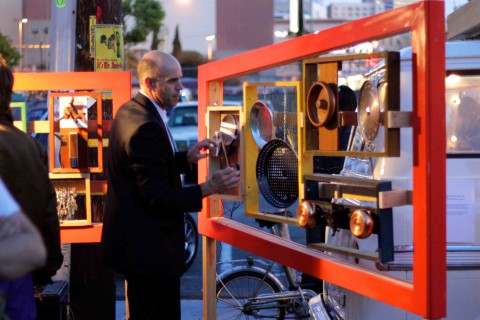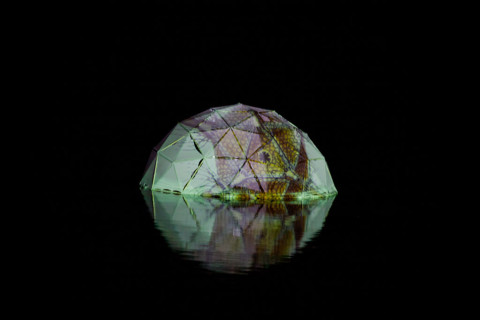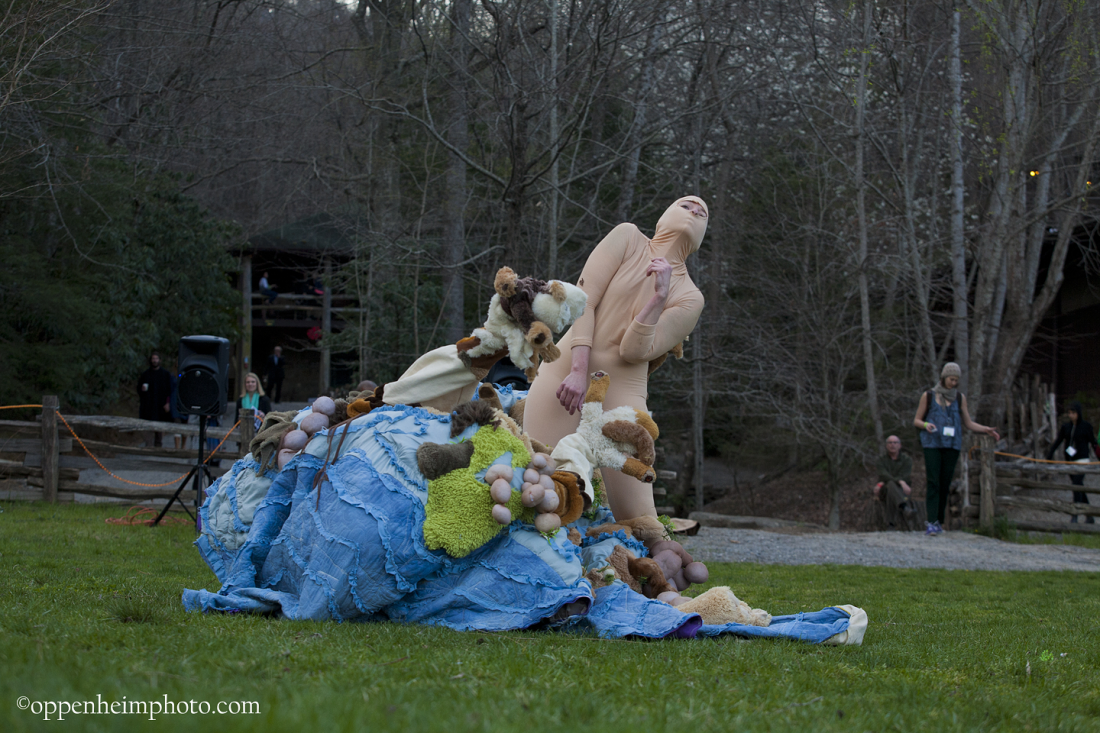On a summer evening in 1952, a handful of people at Black Mountain College forever changed the course of modern art with a single performance — the world’s first happening. The one-night-only, interactive event featured a random blend of simultaneous music, dance, visual art and spoken word, creating a legacy that’s left few, if any, avant-garde artists, organizations, poets, philosophers or performers untouched. On Saturday, April 4, the sixth annual {Re}HAPPENING will aspire to recapture that mythic spirit at the long-defunct school’s former grounds at Lake Eden, now the home of Camp Rockmont.
Honoring the legacy
Jointly organized by the Black Mountain College Museum + Arts Center and The Media Arts Project, the {Re}HAPPENING aims to re-create a typical Saturday evening at the experimental school, which operated from 1933-57.
Attendees fan out across the grounds; performances, installations and artworks will dot the landscape, float atop the lake and fill the numerous cabins lining the property. There’s also a cocktail reception and ticketed dinner in the main dining hall.
With an earlier start this year (3 p.m. instead of 5 p.m.), the 2015 edition boasts almost 100 artists and 30 different projects, all drawing on the college’s myriad creative and philosophical dimensions. Among the dozens of modes and media on display will be butoh performances, sound and sculptural installations, fabric collages and aerial photography. Audience interaction is an essential component of the event.
“Chance Ops,” a series of spontaneous, site-specific works, will unfold throughout the afternoon and early evening. Each “op” will be chosen from a hat, then animated or enacted by an artist at his or her assigned location.
Composer and musician Dorit Chrysler, a leading member of The New York Theremin Society, will be one of the featured performers in the John Cage Room, outfitted by sponsor Moog Music.
“The space,” says Alice Sebrell, the museum’s program director, “will be more focused around Cage’s compositions and his legacy. We’re looking to get closer to one degree of separation by having artists that are working in his style.”
The Cage Room also reflects a greater emphasis on theme in this year’s {Re}HAPPENING. “The goal is to support art that is performance-based or experiential,” says Ursula Gullow, the Media Arts Project’s program director. “This year, all of the projects fall into that category. It’s all in keeping with the spirit of BMC.”
The event is both an homage to and a continuation of the original happening, says Sebrell.
On that historic occasion, Cage read passages from German mystic Meister Eckhart, while Charles Olson and M.C. Richards recited poetry. Meanwhile, Merce Cunningham danced in front of several mirrorlike white canvases painted by Robert Rauschenberg, who played records on an old Victrola.
As the story goes, the whole event was conceived during lunch and performed at dinner that same day. “The whole thing came down from an ongoing conversation between John Cage and David Tudor,” says Sebrell. Cage, who’d returned to the college for a summer session, and Tudor, a pianist and experimental musician, are said to have dreamed up the idea — merging multiple artists and artistic disciplines into a single performance — that afternoon in the dining hall.
“The idea had been percolating for a while,” she says. “Then they ultimately decided that what the artists did within their time signature was up to them.” The entire performance hinged on the element of chance, making it wholly interactive and largely unpredictable.

Broadcasting range
Jolene Mechanic, who was then on the museum’s board, created the first {Re}HAPPENING back in 2010. The inaugural event featured about 30 artists, almost all of them from Western North Carolina. But as the {Re}HAPPENING has grown in scope and stature, so too has the range of contributors.
“As an artist, I’m really interested in what people are doing nationally,” says Gullow, “and it’s important to have artists from around the country come and bring in new ideas that can benefit everyone.”
Involving local artists has long been a priority, but Gullow sees the influx of regional and national performers as a valuable enhancement that also illustrates the conceptual and geographic reach of the college’s legacy. This year’s roster includes participants from Tennessee; Washington, D.C.; New York; Rhode Island; Maine; Illinois; and Nevada.
Las Vegas-based installation artist David Sanchez Burr is among those making his first appearance at the {Re}HAPPENING. Burr will be installing “n o w h e r e r a d i o,” a fully functional, on-site radio station inspired by Cage’s penchant for incorporating chance and interactivity into his work.
The piece features alternative, experimental instruments made out of such items as household appliances, dinner plates, staplers and even pine cones. Arranged in vertical frames, they allow participants to walk freely from one to another.
“The audience becomes the instruments by playing the devices,” says Burr. “They can also just speak or read out literature that I’ve provided.” The sounds are recorded, then channeled through a series of radios scattered across the site, which have been dismantled and reconstructed to display their interiors.
The title’s play on words combines two opposing notions. Burr has set up these radios in diverse, often out-of-the-way places (i.e., the “middle of nowhere”): the desert, a tiny town near Sequoia National Park or, in this case, a mountain valley. Once installed, they can be effectively employed “now” and “here.”
“Broadcasting is and can be a very exclusive field,” he says. “The piece itself is really about community and the idea that anybody can be included and interact with a work of art.”
Mapping the landscape

Video and image projection has been a {Re}HAPPENING mainstay since day one. But this year’s artists are taking it to the next level.
Several projects will feature projection mapping, a site-specific technique that overlays images on irregular surfaces. In this case, the projections will be specifically tailored to the trees and cabins dotting Lake Eden’s hillside. The student-erected Studies Building will become the canvas for “Aquaphonic Scales,” a collaborative piece by Gene Felice, a former Asheville resident who’s now based in Maine, and Asheville musician Kima Moore.
Both are returning {Re}HAPPENING alumni. Felice has played both an organizational and an artistic role in the event since 2010, having served on both sponsoring organizations’ boards when he lived here. But this will be his first time participating solely as an artist.
“Aquaphonic Scales” uses visual projection and audio recording to explore the lake’s microbiology. During the daytime, an open audio-and-microscopy lab and an audio-video workshop will enable participants to explore the microorganisms in Lake Eden. As night falls, Felice will project those microscopic images onto the surface of the Studies Building. Moore, meanwhile, will be capturing sounds from inside the lake and the surrounding area, and playing them through speakers placed between the lake and the school. Felice will also give a talk about the work at 3:15 p.m. in the campus theater.
A Buckminster Fuller-inspired geodesic dome, says Felice, “will be our command center, our lab. It’s adjacent to the spot of the first failure — and, ultimately, the first success — of Fuller’s geodesic dome.”
And in further testament to the {Re}HAPPENING’s national appeal and commitment to artistic collaboration, Felice plans to bring along several students and faculty from the University of Maine in Bangor, where he’s an assistant professor of new media.
“One of the most inspiring things about the BMC legacy was the collaboration,” he says. But despite the school’s profound historical impact, he notes, “Not that many people have an idea as to what the museum and MAP are doing, and are capable of doing, to prolong it.”
WHAT: {Re}HAPPENING 2015, rehappening.com
WHERE: Lake Eden in Black Mountain
WHEN: Saturday, April 4. Performances run from 3-10 p.m.; cocktail reception 5:30 p.m.; dinner 6:30-7:30 p.m. Tickets available at the gate or through BMCM+AC: general admission (performances plus two drink tickets) $18 museum members/$20 nonmembers; kids under 13 $10. With reception and dinner: $75/$85




Before you comment
The comments section is here to provide a platform for civil dialogue on the issues we face together as a local community. Xpress is committed to offering this platform for all voices, but when the tone of the discussion gets nasty or strays off topic, we believe many people choose not to participate. Xpress editors are determined to moderate comments to ensure a constructive interchange is maintained. All comments judged not to be in keeping with the spirit of civil discourse will be removed and repeat violators will be banned. See here for our terms of service. Thank you for being part of this effort to promote respectful discussion.